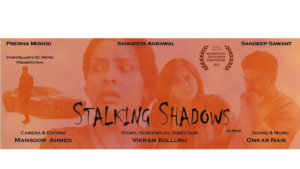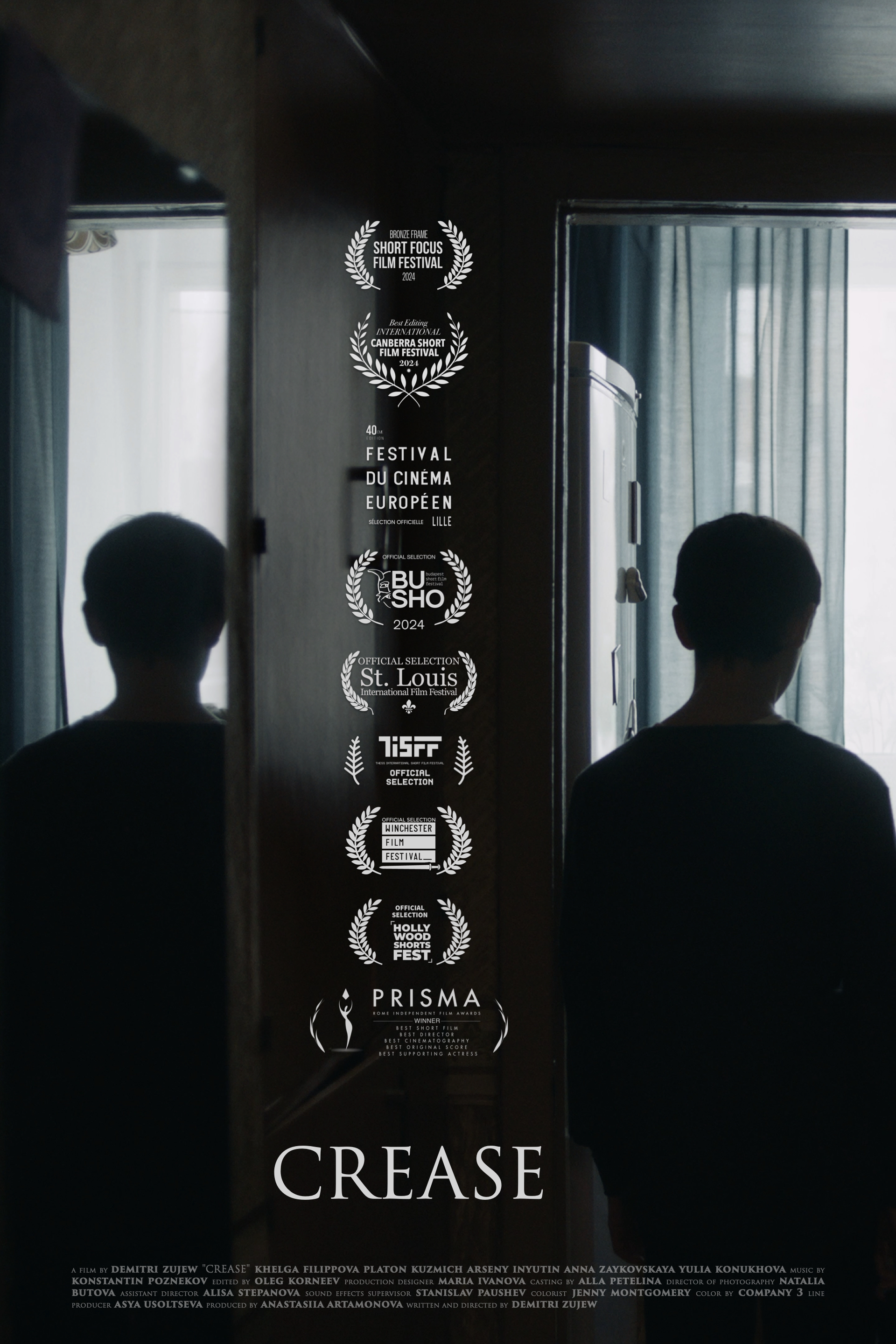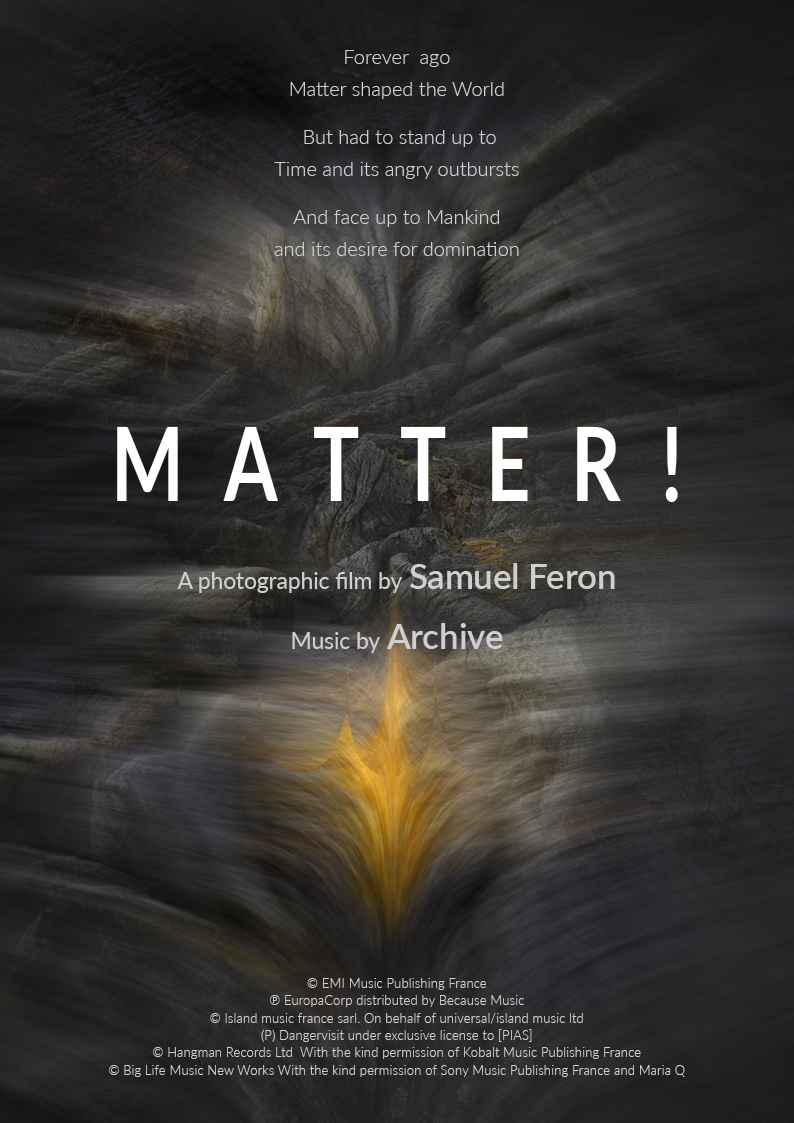
SFS 2020 Short Film Review “Stalking Shadows”
NO TRAILER CURRENTLY AVAILABLE
First, the Recap:
Foreboding. It’s a feeling we never wish to be encountering. It signals an ongoing sense of unease where suddenly everything around us becomes something worthy of fearing. Then, in addtion, there is the constant searching for the source where it is emanating from, whether obvious or more hidden, and all that happens is an increase in our disquiet. A young wife named Anandi (Prerna Mohod) seeks to enjoy her new marriage to dutiful and doting husband Ankur (Sandeep Sawant). However, their newlywedded bliss is becoming interrupted by Anandi’s insistance she has a stalker following her every move. As events escalate and Anandi’s agitations rise to maximum levels, the question then becomes–who is the man following her–and why?
Next, my Mind:
In my experience, when it comes to any film that finds itself in the suspense/thriller genre, there is one of two things that can occur. Either the film tries far, far too hard to elicit jumps, scares, or even the overall atmosphere of menace and falls flat because of it, or the narrative presents the exact amount of edginess and tension that it builds to the point where we are completely, tangibly immersed in it to the intended extents, capitvated and sharing the sense of dread. With this 30-minute short from writer/director Vikram Kolluru, screened as part of the 2020 Storytellers Film Showcase online film festival presented by Storytellers, thankfully it was the latter, and executed with character-driven intensity that beautifully befit the tale being delivered.
The effectiveness of it all truly begins with the nicely uncomplicated manner by which the production is presented, not aiming for outrageously, unrealistic, over-the-top scares or overtly melodramatic characters. Rather, the film finds its foundations on totally normal people who get stuck in an escalating extraordinary series of circumstances that intelligently keeps you totally on the hook and attempting your best to figure out precisely what is going on, why, and what the outcome of it can possibly be. Meanwhile, the palpable air of restlessness and nervous agitation permeates your being, try as you may NOT to feel it just as much as the film’s primary character Anandi, and keeps you fully engaged throughout with smartly written trepidation.
Once the effort reaches its conclusion, which was just as wonderfully impactful and wickedly clever as the rest of the film, I felt it then speaks to many other facets of our human experiences with fear and the dangerously vivid power of the mind when confronted with situations beyond our own ability to deal with. Instead, we allow it to drive our apprehensions further and further, often at the expense of others who may desire to help, yet may not see what we are experiencing as genuine or actually worthy of serious attention, which is also addressed and utilized here to potent ends. It also illustrates the crushing weight of utter fear on the conscious and having the false understanding that there is no escape or hope of returning to normalcy.
The employment of various sounds and objects associated with many a thriller is deftly used here as well–ie: “no one’s there” phone calls, door bell ringing, creaking floors, every closed door could be a revealing of danger, dark cars, and of course, the shadowy figure itself that triggers it all. By the time the film’s conclusion arrives, the happenings have taken a decidedly drastic turn, but it is so magnificently used to make the final points about Anandi’s plight and her poor husband’s ongoing efforts to aid her. A final elements always key to good thrillers is the background music score, which here is orchestrated to the apropos degrees by composer Onkar Naik to create the essential ambiance of consternation necessary to accompany the story.
Yet another facet of this genre that can sometimes be either winning or detrimental is, of course, the acting and the portrayal of stress and nerves being either way overplayed or done with a genuine believability that sells you on it. Again I felt pleasantly treated to the latter thanks to Mohod in her role as Anandi, a young woman simply looking to begin married life who finds herself at the frightening whim of a shadowy figure who seems to appear and disappear at will. Haunted, unsettled, and never having a true moment’s peace, Anandi’s panic heightens to crippling amounts and it becomes uncertain whether her psyche, much less her husband, will be able to make it through. It’s an earnest, emotional, gripping, but feasibly grounded performance by Mohod, embodying the character’s walk between vulnerability and madness with precision and resolve.
Sawant likewise exudes a realistic level of intent through his role as Ankur, Anandi’s husband who for certain isn’t quite sold on what his suffering wife is going through. Even having moments of making light of the whole situation, Ankur finds himself virtually helpless to stop his beloved bride’s distress, though he does try to do so the best ways he feels he can. Once the events take a rather direct and newly desperate turn, the revelations that follow could shine a whole different light on the entire affair, much to Ankur’s surprise and freshly formed perspective on it all. Sawant effectively enacts this volatile journey of his character with a solid mix of understated and acutely ardent moments. Supporting turns are provided from Sangeeta Agrawal as a family friend and Onkar Naik.
In total, with its narrative firmly centered on the battle between ominous reality and fervid paranoia while showcasing the extreme toll it can take on one person’s growing perturbation and profoundly fragile state of being, “Stalking Shadows” can claim itself a victor as a successful thriller, doing so with a style as only indie cinema can provide–straight forward, purposeful, passionate, with all heart for grabbing its audience and achieving full-on entertainment while speaking to the fears we all have had as human beings in some form or another. It’s nothing to take lightly, and maybe that’s the grander message at the core of this effort for us to take away.
As always, this is all for your consideration and comment, Until next time, thank you for reading!




Kirk,
That was quite an in depth analysis. Thank you so much. You read my mind. Your analysis is so good that i myself have started thinking about ways to improve the final product. This was my second short film as a director and have had great learning experiences. Hope everyone likes it.
Its also available on youtube
https://youtu.be/35rpvNH0_y4